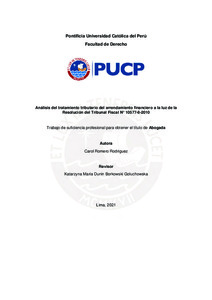Análisis del tratamiento tributario del arrendamiento financiero a la luz de la Resolución del Tribunal Fiscal N° 10577-8-2010
Abstract
En la Resolución del Tribunal Fiscal N° 10577-8-2010, publicada el 14 de diciembre de
2010, se tienen distintas posturas para determinar el tratamiento tributario de dos
operaciones que el contribuyente realiza con una empresa no autorizada para realizar
arrendamientos financieros. En primer lugar, el contribuyente ha considerado las
operaciones como arrendamientos operativos con opción de compra. Por su parte, la
Administración Tributaria las considera como compraventas a plazos. El Tribunal Fiscal,
concluye que son arrendamientos financieros debiéndose considerar en la tributación las
consecuencias que la contabilidad les da.
En el presente trabajo se analiza cuál es el tratamiento tributario de la compraventa a
plazos, del arrendamiento operativo con opción de compra y del arrendamiento
financiero, tanto dentro como fuera del ámbito de aplicación del Decreto Legislativo N°
299. Para ello, se observará brevemente cuál es la relación de la contabilidad con la
tributación. Así también, se recurre a la analogía como un método de integración jurídica,
a fin de dar respuesta ante la ausencia de normas tributarias en el arrendamiento financiero
fuera del Decreto Legislativo N° 299. De esa manera, se expone cuales han debido ser las
consecuencias tributarias para las operaciones del caso, las cuales son arrendamiento y
retroarrendamiento financiero, debiéndose poner en el activo a los equipos y maquinarias. In Tax Court Resolution No. 10577-8-2010, published on December 14, 2010, there are
different positions to determine the tax treatment of two operations that the taxpayer
carries out with a company that is not authorized to carry out financial leases. On the one
hand, the taxpayer has considered the operations as operating leases with purchase option.
For its part, the Tax Administration considers them as an installment sale. The Tax Court
concludes that they are financial leases, and the consequences that accounting gives them
should be considered in taxation.
This paper analyzes what is the tax treatment of installment sales, operating leasing with
purchase option and financial leasing, both within and outside the scope of Legislative
Decree Nº 299. To do that, it will be briefly observed what is the relationship of
accounting with taxation. Likewise, the legal analogy is used as a method of legal
integration, in order to respond to the absence of tax regulations in financial leasing
outside of Legislative Decree Nº 299. In this way, it is exposed what the tax consequences
should have been for the operations of the case, which are financial leasing and leaseback,
and the equipment and machinery must be put into assets.
Temas
Leasing
Contabilidad--Normas
Impuestos--Legislación--Perú
Derecho tributario--Legislación--Perú
Contabilidad--Normas
Impuestos--Legislación--Perú
Derecho tributario--Legislación--Perú
Para optar el título de
Abogado





